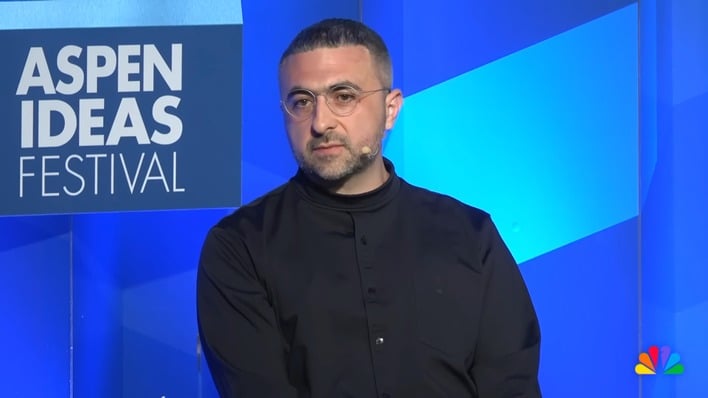
Public opinion is turning against AI on certain topics. Some people have been dubious about the practical benefits of all the power and money spent on developing and operating AI for some time, but recently, leadership at multiple companies has gone completely “mask off” with regard to how they feel about the impact of AI on society and its denizens, and it’s not a good look.
This quote comes from an interview of Suleyman by CNBC’s Andrew Sorkin at the Aspen Ideas Festival. Aspen Ideas Festival is a week-long series of seminars and panels hosted by the Aspen Institute think tank. In the interview, Sorkin poses a very reasonable question to Suleyman, who then completely fumbles the ball with his answer. Here’s the question and Suleyman’s full answer…
Sorkin: It appears that a lot of the information that [AI] has been trained on over the years has come from the web. Some of it’s on the open web, and some is not. We’ve heard stories about how OpenAI was turning YouTube videos into transcripts and then training on the transcripts. The question; who is supposed to own the IP? Who is supposed to get value from that IP? And whether, to put it in very blunt terms, whether the AI companies have effectively stolen the world’s IP?
Suleyman: I think—look, it’s a very fair argument. I think that with respect to content that is already on the open web, the social contract of that content, since the 90s, has been that it is fair use. Anyone can copy it, recreate with it, reproduce with it—that it has been freeware, if you like; that has been the understanding. There’s a separate category where a website, or a publisher, or a news organization had explicitly said, “do not scrape or crawl me for any other reason than indexing me so that other people can find that content. That’s a gray area, and I think it’s going to work its way through the courts.”
Sorkin: What does that mean, when you say it’s a gray area?
Suleyman: Well, if, if—so far, some people have taken that information—I don’t know who hasn’t—but that’s going to get litigated and I think that’s rightly so.
Suleyman’s response smacks of a Silicon Valley tech bro who, like the scientists in Jurassic Park, is so excited about his technology that he doesn’t understand the implications or ramifications of it, except that Suleyman absolutely understands—or he should, because he’s been in this situation before.
Back in 2016 when Suleyman was at Google’s Deepmind, the company harvested millions of records containing supposedly-confidential patient data from hospitals operated by the UK’s National Health Service. The data-sharing agreement went far beyond what was publicly announced, and it was done largely without consent from the patients in question despite that the records included day-to-day data on hospital operations and patient movements. Faced with criticism over Deepmind’s actions, company co-founder Suleyman was dismissive, saying that people who objected to the data-sharing agreement were “driven by a group with a particular view to peddle.”
Then, as now, his attitude was that he was entitled to use other people’s data for his own purposes, and anyone objecting is just a hater. He speaks from a place of immense privilege, arrogance and ignorance, or both, of the realities of being a creative worker in 2024 and of copyright law, because there is no “free use social contract” in place on web content. For example, HotHardware itself prohibits the use of its content with copyright notices firmly in place.

Users on social media have been lambasting Suleyman’s comments, including the posts above. We particularly like the post calling his mindset “shoplifter logic,” as it completely encapsulates his line of thinking—especially the part where he goes on to say that AI companies are going to keep stealing the hard work of creatives like us here at HotHardware until we sue them over it. It’s a very dystopian attitude.
We’re a tech news and review publication primarily, so obviously we are well aware of the potential of AI to accelerate workflows and make life easier for humans. We’re also all too aware of the potential for AI to do harm. For Suleyman to describe most content on the open web as “freeware,” open for the taking, is a ghastly sentiment that we hope Suleyman is soundly castigated for.